The Bigger Table Podcast
At Bigger Table, we believe progress is built by adding more chairs — not more walls. Join us for real conversations about truth, justice, community, and change, all delivered with sharp analysis and a spirit of hope. We call out misinformation, uplift victories, and challenge the status quo — because a better future needs more voices, not fewer. Pull up a chair... there’s always room for one more.
Episodes
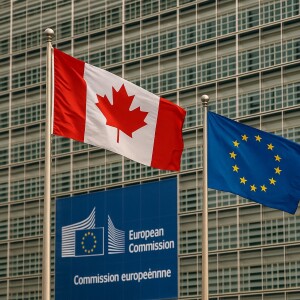
11 hours ago
11 hours ago
Canada’s U.S. dependency is risky. In this episode, we examine why the EU may offer a more intelligent, stable path for trade, security, and leadership.
Join host Abbey Inglewood in the latest episode of "Bigger Table," as we explore Canada's evolving international relationships and why leveraging partnerships, rather than relying on a single ally, is crucial for the nation’s future. Titled "What if I told you Canada's biggest ally might also be its biggest liability," the episode delves into Canada's deep-seated ties with the United States, assessing how political fluctuations and trade tensions south of the border threaten Canada's economic stability.
Abbey navigates the intricate dynamics of Canada’s partnership with the EU. Discover how agreements like CETA solidify economic ties and how shared values in democracy, human rights, and climate leadership lay the groundwork for deeper collaboration. The discussion unveils the potential for innovation in clean energy and digital privacy, emphasizing how Canadian firms stand to benefit from EU's stable governance.
However, the episode doesn't shy away from challenges; listeners will learn about the logistical hurdles and regulatory complexities within the EU that pose obstacles for Canadian businesses. The conversation also touches on the agricultural sector’s concerns and the political impracticalities of full EU membership.
In a world of shifting alliances, the message is clear: Canada doesn't have to choose between the U.S. and the EU. Instead, this episode champions a strategy of multilateralism and strategic partnerships, urging for a bigger table where more voices are heard, and fewer walls are built. Tune in and discover how Canada can lead with resilience and pragmatism in an unpredictable global landscape.

Friday May 30, 2025
Friday May 30, 2025
Discover how one woman’s fight for justice against fossil fuel companies could shift climate accountability and pave the way for future climate-related lawsuits worldwide.
Welcome to this riveting episode of Bigger Table, where personal loss meets global accountability. Join us as we delve into the heart-wrenching story of Misty Leon, a woman who lost her mother, Juliana Leon, during the unprecedented 2021 heatwave in Seattle. This tragic event, directly linked to climate change, set Misty on a courageous path to justice as she took on the world's largest oil companies in a landmark lawsuit.
Listen in as we uncover the lawsuit's bold claims, supported by solid scientific evidence that underscores how emissions from ExxonMobil, Chevron, Shell, BP, and other major corporations contributed to the deadly heat. Learn about the significance of this case, the legal stakes involved, and the cautious or dismissive responses from the companies implicated in this potentially game-changing climate litigation.
Explore the broader implications for our world, as this case could redefine how governments, companies, and courts approach the human costs of climate change. As Misty Leon fights for her family and our future, her struggle represents a transformative moment in the climate justice movement. This episode highlights why climate change is not just an environmental issue, but a life and death matter demanding accountability from those responsible for its impacts.
Tune in to understand the potential historic precedent this case might set and consider how it could reshape climate policy and corporate behavior worldwide. Join the conversation for an insightful exploration of Misty Leon's battle against the status quo, advocating for more voices, fewer barriers, and meaningful progress.

Friday May 30, 2025
Friday May 30, 2025
Explore Canada’s bold shift from U.S. defense reliance to European partnerships with Prime Minister Mark Carney’s push for Readiness 2030. A new era in sovereignty and strategy.
In this episode of Bigger Table, we dive into a significant transformation in Canada's defense strategy. Hosted by our passionate team, this episode highlights Canada's move towards defense independence. Historically bound by a strong reliance on U.S. defense contracts, Prime Minister Mark Carney is reorienting Canada to collaborate more closely with Europe. Underlining the strategic pivot is the ambitious Readiness 2030 program, a European initiative that promises innovations with its $800 billion budget.
Listeners will glean insights into Canada's decision to potentially shelve a $13.3 billion deal for 88 F-35 fighter jets from the U.S. Evaluating options from Europe or domestic production emphasizes this strategic shift towards nurturing Canadian industries and tech sectors. Referencing historical parallels such as the Avro Arrow and the Iraq War stance, the episode reinforces Canada's tradition of independent decision-making. The discussions not only detail the benefits—such as enhanced military capabilities and new markets for Canadian companies—but also position Canada as a proactive international partner rather than a junior associate.
Join us as we explore the depths of this change, contemplating its implications for Canadian workers, technological growth, and international alliances. As always, Bigger Table encourages open discussions, inviting listeners to reflect on Canada's future in global defense politics. Tune in to understand why Canada’s strategic realignment isn't just about military assets, but about enhancing the nation’s sovereignty, economic health, and partnership flexibility on the world stage.

Wednesday May 28, 2025
Wednesday May 28, 2025
Discover the truth behind the U.S. rollback of COVID-19 vaccine recommendations for healthy adults and children. Learn how misinformation, politics, and policy decisions put millions at risk.
In this episode of Bigger Table, we dive into a critical issue impacting public health, science, and personal safety—the recent rollback of COVID-19 vaccine recommendations in the United States. On May 27, 2025, the U.S. Department of Health and Human Services, led by Secretary Robert F. Kennedy Jr., announced a controversial policy change that shocked health experts nationwide. By removing vaccine recommendations for healthy children, pregnant women, and adults under 65, this decision has sparked widespread concern about its implications for public safety and trust in science.
Join us as we explore the motivations behind this rollback, including the involvement of known vaccine skeptics such as Secretary Kennedy, Dr. Marty Macri, and Dr. Jay Bhattacharya. We delve into the official reasons given by HHS leaders—citing a lack of clinical data on repeat booster shots for these groups—and challenge this narrative with real-world data demonstrating the effectiveness of COVID vaccines in preventing severe disease and death.
We'll also discuss the broader impact of this policy shift, which is rooted in years of misinformation and political agendas. From right-wing media to social media influencers, we examine how these narratives have been codified into policy, thereby denying access to life-saving vaccines for millions of Americans. The rollback has deepened health inequities, restricting access to vaccines primarily for low-income and rural communities, while wealthier individuals may find alternative means to get vaccinated.
As we navigate through the political and social influences that led to this policy, we emphasize the importance of staying informed and advocating for evidence-based public health policies. Learn how you can make a difference by sharing credible information and urging representatives to prioritize health and science over politics. Tune in for a comprehensive discussion on how this policy affects every American and what steps can be taken to protect public health and safety.
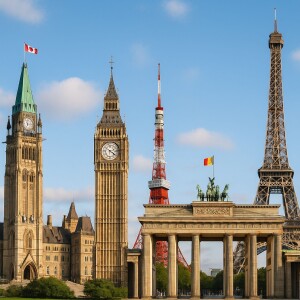
Tuesday May 27, 2025
Tuesday May 27, 2025
🎧 Discover how the G7 nations shape our world—Italy, Canada, France, UK, Japan, Germany, and the U.S. From politics to culture, we decode global power!
Welcome to a new episode of Bigger Table, where we explore the dynamics and influence of the G7, a formidable forum of seven major economic powers. This episode takes you on a journey through Italy, Canada, France, the United Kingdom, Japan, Germany, and the United States, diving into what makes each nation unique and essential to global discourse.
We begin with Italy, known for its vibrant cultural heritage and robust economic presence, and travel north to Canada, where climate action and economic stability are integral to its identity. France stands as a beacon of diplomacy, balancing political power with cultural legacy. Meanwhile, the United Kingdom wrestles with post-Brexit challenges while maintaining its global influence through rich traditions and modern innovations.
The episode then shifts focus to Asia's industrial leader, Japan, exploring its technological prowess and cultural blend, followed by Germany, the engine of Europe, known for its economic might and leadership in renewable energy. Finally, we delve into the United States, examining its unparalleled economic force and cultural weight amid rising political polarization.
This episode uncovers the challenges and unique contributions of each G7 member, exploring the shared values and cooperation that keep this diverse group united despite differences. As globalization rapidly changes the world order, understanding the G7's role offers crucial insights into international governance and the pursuit of global stability.
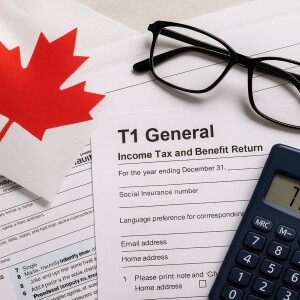
Monday May 19, 2025
Monday May 19, 2025
Canada’s new 2025 tax cut lowers the lowest federal income tax rate from 15% to 14%. Find out who benefits, how much you’ll save, and what it means for your paycheque.
Welcome to the Bigger Table podcast, where we explore meaningful changes with far-reaching effects. In this episode, we delve into the exciting news for millions of Canadians—Prime Minister Mark Carney's government announced a new income tax cut. This episode takes you through the changes starting July 1st, 2025, when the federal tax rate on the first portion of income will decrease from 15% to 14%.
This seemingly small change promises significant annual savings, potentially putting hundreds of dollars back into the pockets of Canadians earning a paycheck, particularly benefiting middle and lower-income families. For 2025, an individual earning $50,000 could see savings of approximately $287, with two-income households seeing $574 in extra take-home pay. And in 2026, the savings will double as the new tax rate fully applies.
We discuss the seamless implementation of these changes by the Canada Revenue Agency and how it will affect your paycheck without you needing to take any action. This move signifies a political shift by the new government, focusing on affordability and economic fairness, a promise made by PM Mark Carney and echoed by Finance Minister François-Philippe Champagne.
While this tax cut stands as a boon for hard-working Canadians, it's not without controversy. Critics question the impact of a $27 billion relief on federal revenues and underline the absence of compensatory measures targeting wealthier Canadians or corporations. Yet, the intention remains clear - providing immediate financial relief to citizens.
This episode gives you the complete breakdown of the first of potentially many reforms under the new leadership and encourages a watchful eye on future legislative developments. Stay informed on how upcoming policy changes can affect your financial standing. Enjoy the conversation and keep advocating for a more inclusive and progressive society with the Bigger Table podcast.

Friday May 16, 2025
Friday May 16, 2025
What if Canada could lead the $2.5 trillion green hydrogen boom? Explore the fuel of the future, clean jobs, and how we turn climate action into economic power.
In this eye-opening episode of Bigger Table, we dive into the exciting world of green hydrogen. This clean energy source produces only water when used, offering a pollution-free alternative to fossil fuels. Join us as we explore why green hydrogen is not just a futuristic concept, but a present-day reality with immense potential to revolutionize energy industries worldwide.
Learn how Canada's vast renewable energy resources, advanced technological landscape, and skilled workforce position it ideally to become a global leader in the burgeoning green hydrogen market. With the potential to hit a staggering $2.5 trillion by 2050, this market offers Canada a significant opportunity to transition from traditional oil and gas industries to a sustainable, clean energy economy.
The episode provides a visionary outlook on how green hydrogen can decarbonize sectors like heavy transport and high-heat industries—areas where batteries currently fall short. However, realizing this potential requires overcoming challenges such as infrastructure development, investment, and political commitment. The conversation emphasizes that while other countries like Germany and the United States are making significant strides, Canada must act swiftly to capitalize on its natural advantages.
Join us as we discuss the critical role of ambition and innovation in driving Canada's clean energy future. Could green hydrogen be the country’s next big economic strategy? Tune in to find out, and get inspired to imagine a future where Canada not only competes but leads in the global clean energy transition.
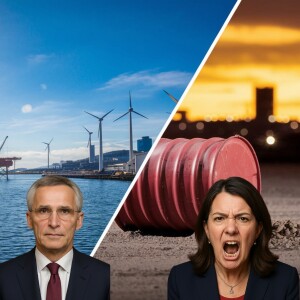
Tuesday May 13, 2025
Tuesday May 13, 2025
Norway built a $1.6T oil fund. Alberta built budget cuts and regrets. Same oil, different brains. This is what happens when politics beats planning.
In this thought-provoking episode of Bigger Table, host Abbey Englewood delves into the contrasting stories of two oil-rich regions, Norway and Alberta, and explores the long-lasting impacts of their financial decisions made decades ago. Abbey begins by highlighting the remarkable journey of Norway, which, after discovering oil in 1969, established the Government Pension Fund Global in 1990. This prudent decision has resulted in a fund worth over $1.6 trillion U.S., ensuring its citizens' stable and prosperous future.
In stark contrast, despite its promising oil discovery in 1947 and the establishment of the Heritage Savings Trust Fund in 1976, Alberta faltered due to political short-sightedness. Instead of preserving their oil wealth, politicians dipped into the fund to balance budgets and fund short-term programs, leading to a significantly smaller savings compared to Norway's. Abbey emphasizes the crucial mindset difference between the regions, with Norway focusing on long-term planning and Alberta succumbing to short-term political pressures.
The episode further examines the ramifications of these decisions, as Norway enjoys robust public services and a resilient economy, while Alberta continues to experience financial instability with each fluctuation in oil prices. Abbey concludes by challenging listeners to learn from these case studies, advocating for visionary leadership and disciplined financial management to secure a prosperous future. Join Abbey at the Bigger Table as she examines these important lessons and encourages a future of more chairs and fewer walls.
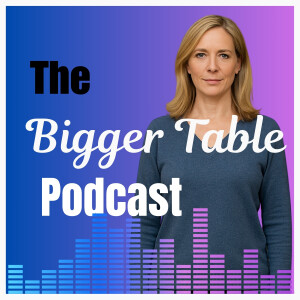
Tuesday May 06, 2025
Tuesday May 06, 2025
"America dominates the world in wealth and power... but when it comes to healthcare, safety, and opportunity, the cracks run deeper than slogans suggest."
Welcome to another enlightening episode of Bigger Table. Today we delve into the often unquestioned notion of America's supremacy. Through a series of thought-provoking discussions, we explore what it truly means for the United States to be "number one." While America leads in military spending and boasts an impressive array of billionaires, these successes come at significant societal costs.
We begin by examining America's unparalleled investment in defense. With a budget exceeding the combined spend of the next ten countries, we discuss the implications of this dominance on its citizens' everyday lives, particularly when compared to the Canadian perspective. Our analysis highlights the stark choices faced by billions: between defense and critical social services like healthcare and education.
The conversation doesn't stop at military might. We dig deep into America's cultural influence and the extravagant wealth seen in tech giants and private endeavors. This contrasts sharply with Canada's more equitably distributed wealth, providing its citizens with a steadier path to economic stability. We also tackle the struggles of America's healthcare system, where expenditures don't always translate into results. Despite its heavy spending, the U.S. lags behind Canada and other nations in healthcare access and outcomes.
Education is another area under scrutiny. Despite its immense resources, America's global educational standing is surprisingly middle-tier, highlighting systemic issues such as student debt and underpaid teachers. Moreover, we discuss the serious social issues such as child poverty and gun violence that plague American communities, exploring how Canada's policies offer a beacon of hope for more balanced and humane governance.
This episode paints a complex picture of America—a nation rich in opportunity and innovation yet riddled with profound inequities and challenges. Through this critical comparison, we hope to spark meaningful conversations about national identity, global leadership, and what truly constitutes progress and prosperity. Join us as we interrogate these pressing issues, appreciating the powerful lessons Canada offers in crafting a fairer, more inclusive society.

Monday May 05, 2025
Monday May 05, 2025
Canada’s immigration rate is 7X higher than the U.S. — now PM Carney wants to dial it back. Is it smart policy… or a step too far? Let’s unpack it.
In this episode of Bigger Table, we explore the complexities of Canada's immigration policies and how they contrast with its southern neighbor, the United States. As Canada faces an influx of temporary residents, assessing the implications on housing, healthcare, and urban infrastructure is poignant.
We delve into Prime Minister Mark Carney's new proposal aimed at reducing temporary immigration rates from the current 7.3% to below 5% by 2027. The episode critiques if this is a strategic move or a subtle form of xenophobia, while comparing it with the U.S.'s immigration approach.
This episode is enriched with insights into Canada's current economic and housing challenges and provides highlights from Carney's first press briefing, outlining his plans for the nation's future. Listeners are invited to question whether Canada has been overextending itself or if it's setting a benchmark the rest of the world should strive to reach.
Tune in as Bigger Table continues to invite more voices to the conversation, championing diversity, inclusion, and progress. Don't miss this informative episode as it charts the path of Canada's immigration and economic strategy.






